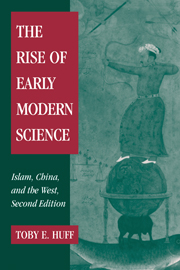Book contents
- Frontmatter
- Dedication
- Contents
- List of illustrations
- Preface to the second edition
- Preface to the first edition
- Acknowledgments
- Introduction
- 1 The comparative study of science
- 2 Arabic science and the Islamic world
- 3 Reason and rationality in Islam and the West
- 4 The European legal revolution
- 5 Madrasas, universities, and science
- 6 Cultural climates and the ethos of science
- 7 Science and civilization in China
- 8 Science and social organization in China
- 9 The rise of early modern science
- Epilogue: educational reform and attitudes toward science in the Muslim world and China since the eighteenth century
- Selected bibliography
- Index
Introduction
Published online by Cambridge University Press: 05 June 2016
- Frontmatter
- Dedication
- Contents
- List of illustrations
- Preface to the second edition
- Preface to the first edition
- Acknowledgments
- Introduction
- 1 The comparative study of science
- 2 Arabic science and the Islamic world
- 3 Reason and rationality in Islam and the West
- 4 The European legal revolution
- 5 Madrasas, universities, and science
- 6 Cultural climates and the ethos of science
- 7 Science and civilization in China
- 8 Science and social organization in China
- 9 The rise of early modern science
- Epilogue: educational reform and attitudes toward science in the Muslim world and China since the eighteenth century
- Selected bibliography
- Index
Summary
For the past five hundred years in the West, the pursuit of science has been more or less unfettered. If, in the light of more recent assessments of the freedom of thought and inquiry that existed in the universities of the twelfth and thirteenth centuries, we add another three hundred years, then we may say that the pursuit of science in the West has been carried on undiminished for nearly nine hundred years. This flight of the imagination, if you will, was both sponsored by and motivated by the idea that the natural world is a rational and ordered universe and that man is a rational creature who is able to understand and accurately describe that universe. Whether or not men and women can solve the riddles of existence, so this view goes, they are able to advance human understanding mightily by applying reason and the instruments of rationality to the world we inhabit.
The breakthrough that allowed freedom of scientific inquiry is undoubtedly one of the most powerful intellectual (and social) revolutions in the history of humankind. As the paradigmatic form of free inquiry, science has been given a roving commission to set all the domains of thought aright. Science is thus the natural enemy of all vested interests – social, political, and religious – including those of the scientific establishment itself. For the scientific mind refuses to let things stand as they are. The organized skepticism of the scientific ethos is ever present and always doubtful of the latest (and even the long-standing) intellectual consensus.
Given this intellectual commission to investigate all forms and manner of existence, science is especially the natural enemy of authoritarian regimes. Indeed, such regimes can exist only if they repress or otherwise subvert those forms of scientific inquiry that reveal the true nature of the social – economic, political, and medical – consequences of their rule. We must be careful here not to confuse journalism and the press with science.
- Type
- Chapter
- Information
- The Rise of Early Modern ScienceIslam, China and the West, pp. 1 - 7Publisher: Cambridge University PressPrint publication year: 2003

